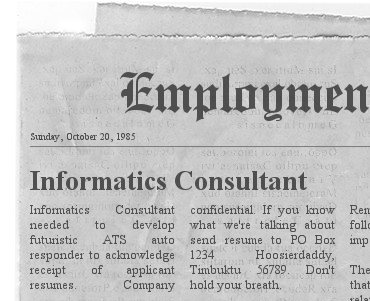 Candidates are just beginning to become familiar with the phraseology surrounding their job search - largely due to blogging recruiters letting the cat out of the bag validating that it might actually be important. War for talent, candidate experience, candidates as customers, rejection feedback, employer brand... sounds like someone has been trying to create job security by making up things to do by creating buzz around things that never used to be.
Candidates are just beginning to become familiar with the phraseology surrounding their job search - largely due to blogging recruiters letting the cat out of the bag validating that it might actually be important. War for talent, candidate experience, candidates as customers, rejection feedback, employer brand... sounds like someone has been trying to create job security by making up things to do by creating buzz around things that never used to be.
The 80's
I remember photocopying my rsum, folding it along with a carefully typed cover letter and stuffing into an envelope, addressing it to a PO Box number - company unknown, licking the minty glue to seal it and the yucky government glue on the back of the stamp to send it and depositing it into oblivion in the cavernous corner US Postal Service metal repository... never to know what became of it. No way to know if it was delivered, no way to follow up. Discussing this very topic the other day with others who sought employment when big hair was in style, we all agreed that back in the day you didn't question. You either got a call or you didn't. That was the answer. Occasionally you got a letter which you didn't want to open because you knew it was going to say that you had many of the skills and qualifications to do the job but someone else was more qualified so thanks, but no thanks. You wondered why they wasted the stamp.
So why does it matter in 2010?
Candidates have always wondered why they didn't get a call, didn't get the job and how they could have performed better at the interview but unlike in the disco days, today anyone interested in knowing about the candidate selection process, how recruiters work and how companies make their decisions, only has to consult a search engine to happen upon recruiter social media networks, blogs and industry white papers telling them. They can self educate and they do. The workforce is no longer an outsider to the selection process.
As the gap widens like a crater on a fault line during an earthquake between industry needs and workforce skills, with 3.2 million job vacancies unable to be filled, regardless of the unemployment rate, those who are prepared are in higher demand then ever. Recruiters and candidates now treat skills, abilities and track records of success as sought after commodities to be brokered.
Candidates are learning to be savvy, to use technology not only to look for jobs but to go through the front doors and back channels. To brand and market themselves. That they are the media. That they can buy pay per click to get noticed.
Companies are learning that filling ever increasing technical positions requires searching in an ever decreasing skilled candidate pool which is becoming ever more demanding as it becomes ever more elite. The elite (in anything) quickly gain micro celebrity status and everyone wants them so they can be demanding.
In the era of social transparency, we in the industry have helped to provide job seekers with more tools, tips and assistance then they have ever had before. We have enabled anyone who can conduct a basic Internet search to dig past the gatekeeper...
That's why it matters in 2010... Oh, and then there's that nasty little detail about it being the right thing to do.
What does your candidate service level agreement look like?
Leave a Reply